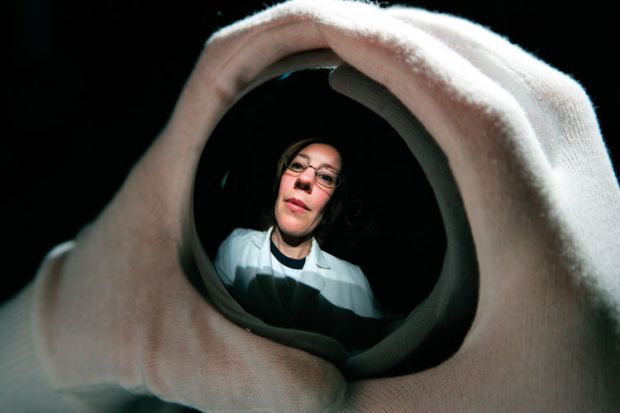The Athena SWAN charter may be poised to spread its wings and take flight Down Under by setting up a similar scheme for Australia, but back at its nest serious changes are afoot.
Come January the Equality Challenge Unit, which runs the charter, will no longer receive funding from the Higher Education Funding Council for England, and will move to a subscription model for its work with English universities.
In other changes at the organisation, it was announced earlier this year that the flagship charter mark designed to promote the careers of women in science, technology, engineering, maths and medicine (STEMM) has been expanded – as first proposed in 2013 – to include arts, humanities, social sciences, business and law departments.
The STEMM award, which is now in its 10th year, has already been rolled out to institutions in the Republic of Ireland, and talks are under way with other countries in addition to Australia. Research organisations that are not affiliated to a university can now apply for the awards, and the ECU is also developing a new racial equality charter mark, following trials that began in 2013.
David Ruebain, ECU’s chief executive, told Times Higher Education that Athena SWAN had reached “a critical mass”.
There is a “zeitgeist” around the gender equality agenda, he explained. Outside academia, for example, the 30% Club is aiming to ensure that by the end of 2015, 30 per cent of the members of boards of FTSE 100 companies are women.
“A lot of people are talking about it, of all political persuasions in many countries, so there is a groundswell of support that has also assisted us in growing the Athena SWAN charter,” Mr Ruebain said.
But with the expansion comes “huge challenges” as well as opportunities, he added. Athena SWAN has expanded from a “fairly small modest voluntary initiative” that received 35 applications in its first year to a programme that attracted nearly 500 applicants in 2014.
“When I joined the ECU in 2010 we had 0.6 of a [full-time equivalent staff member] working on Athena SWAN,” he said. It now has five people centrally and more based elsewhere, and “the push on the team is huge”.
Stakes continue to rise
In addition to the management and coordination of hundreds of peer reviewers to look at each application in depth, awards must be moderated to ensure consistency in decision making, and an appeals process has been introduced.
The fact that there is now much more at stake when institutions apply for the charter mark has driven the need for these measures. In 2011, Dame Sally Davies, the chief medical officer, said that medical schools without an Athena SWAN silver award would not be eligible for Department of Health research funding. Since then, Research Councils UK has mooted the idea of tying research council funding to the membership scheme.
Some outside the ECU view the expansion with trepidation, citing concerns about whether it will be able to keep up with the workload involved. Dame Athene Donald, professor of experimental physics at the University of Cambridge, said that the research community is anxious about whether the move to expand the range of charter marks will “dilute the Athena SWAN brand that has been so effective in improving the gender climate so far”.
“The more emphasis that is put on these awards, the more important it is that the process is carried out well and consistently,” she added.
Dame Athene said that in light of the expansion, universities are looking for assurances that ECU structures are “robust enough” and sufficiently resourced to carry out the assessments reliably so that “an award in one round and one discipline means the same as six months later and for another discipline”.
“If it became a mere tick-box exercise it would definitely be a backward step,” she added.
The issue was also raised at the University and College Union’s annual congress earlier this year. Delegates passed a motion to “investigate ways that charter marks...may be covering up ineffective equality implementation”.
Far from a tick-box approach
But Mr Ruebain denied that the charter has lost rigour. “The Athena SWAN charter is about as far away from a tick-box approach as I have seen in my career,” he said.
“It is in the nature of the charter whereby the difficulties and solutions for one department may not be the same as for another, and critically [it] requires understanding self-analysis, self-critique and engagement,” he said.
In response to criticisms, the ECU has made efforts to ensure that the awarding process is more transparent. It has issued new guidance, and formalised and published its processes. Departments or institutions that are unsuccessful receive feedback on their application the same day. Many of the departments that have been successful also want feedback, and the ECU is working on providing it more promptly.
Although the details of unsuccessful applicants for new awards or renewals are not released publicly, such failures do happen, Mr Ruebain said. When this happens, the ECU meets with senior management to discuss the situation and offer an increased level of support for future applications.
The organisation has faced criticism for there being no real consequences for losing an award. But Mr Ruebain maintained that the ECU is not a regulator. “Our job is to support the sector and we want them to succeed. It is a bit different from other awards; in theory no one has to fail,” he said.
In May, the ECU closed a consultation on its funding changes. Details of how the subscription model will work have yet to be finalised, but the document asked for views on charges ranging from £4,000 a year for small institutions to £20,000 for the largest to cover access to its research, guidance and advice, newsletter, helpline, conferences and seminars, and importantly, access to its charters.
Key messages that have come out of the consultation process include requests by institutions for stronger and more focused individual relationships with the ECU, and stronger customer service standards, he said.
Mr Ruebain would not speculate on the take-up of the new scheme, but stressed that the ECU has “good ongoing relationships” with many universities.
But he conceded: “It is a challenging time for [the] ECU, because if we are not able to persuade the sector of the value for money and the strength of our work assisting them, then inevitably we will have less resource to deliver.”




